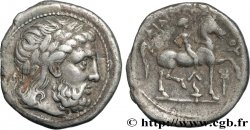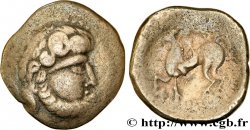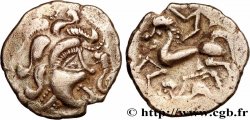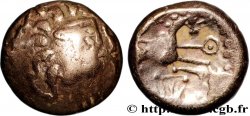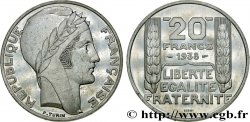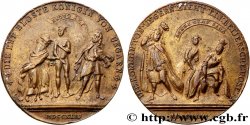v32_0961 - CELTI DEL DANUVIO Tétradrachme “au rameau”
MONNAIES 32 (2007)
起拍价 : 420.00 €
估价 : 750.00 €
未售出的物品
起拍价 : 420.00 €
估价 : 750.00 €
未售出的物品
种类 Tétradrachme “au rameau”
日期: (IIe-Ier siècles avant J.-C.)
材质 silver
直径 25,3 mm
模子方针 12 h.
重量 13,96 g.
稀少度 R2
关于品相的说明
Monnaie bien centrée avec tous les détails biens venus, mais avec une certaine usure homogène. Le métal est recouvert d'une très légère patine grise
出版目录中的项代码 :
家谱
Cette monnaie provient d’une collection américaine du début du XXe siècle
正面
正面的文字 ANÉPIGRAPHE.
正面的说明书 Tête laurée de Zeus à droite ; grènetis.
背面
背面的说明书 Cavalier au pas à droite, tenant une palme de la main droite ; le cheval lève l'antérieur à droite, encadrée d’un annelet pointé et d’un dauphin ; au-dessus du cavalier, la légende.
背面铭文 FILIP
评论
Si le statère d'or de Philippe II de Macédoine a servi de prototype à de nombreuses imitations gauloises, le tétradrachme n'a pas été imité en Gaule, mais reste principal sujet d'inspiration des monnaies pour les Celtes du Danube (LT. 9697-9767, 9768-9832, 9618-9630, 9870-9886). Les premières imitations furent frappées dans le premier quart du IIIe siècle avant J.-C. La fabrication des copies serviles, puis des imitations, enfin des frappes celtiques continuèrent pendant plus de deux siècles.
Le revers est particulièrement intéressant, avec des motifs assez inhabituels ; le dauphin devant le cheval est particulièrement bien visible, alors qu'il est difficile de déterminer la nature du motif partant de la ligne d'exergue.
Cet exemplaire correspond au n° 961 ou 973 (même photo) du musée de Vienne.
Le revers est particulièrement intéressant, avec des motifs assez inhabituels ; le dauphin devant le cheval est particulièrement bien visible, alors qu'il est difficile de déterminer la nature du motif partant de la ligne d'exergue.
Cet exemplaire correspond au n° 961 ou 973 (même photo) du musée de Vienne.








 对产品描述纠错
对产品描述纠错 打印
打印 分享我的选择
分享我的选择 提问
提问 Consign / sell
Consign / sell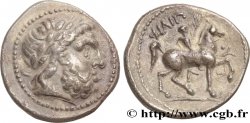
 产品介绍
产品介绍